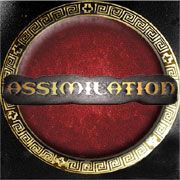Retro Replay Review
Gameplay
Assimilation takes the classic territory-control puzzle formula and elevates it with a deceptively simple rule set that unfolds into deep strategic possibilities. Drawing inspiration from the famous microscope puzzle in The 7th Guest, the game challenges you to block out and absorb your opponents’ beads through carefully planned movements. Each turn, you must decide whether to advance aggressively, consolidate your current holdings, or disrupt the balance by cutting off an adversary’s supply lines. The core loop is both intuitive for newcomers and rich enough to satisfy veteran tacticians.
(HEY YOU!! We hope you enjoy! We try not to run ads. So basically, this is a very expensive hobby running this site. Please consider joining us for updates, forums, and more. Network w/ us to make some cash or friends while retro gaming, and you can win some free retro games for posting. Okay, carry on 👍)
What distinguishes Assimilation is its versatile array of boards and scenarios. From tight corridors that force head-on confrontations to sprawling hex grids that reward expansive play, each map shifts the emphasis between offense and defense. The second screenshot—serving as an interactive rulebook with detailed illustrations—does an excellent job of guiding you through advanced tactics, such as chain captures and multi-directional flanks. As you progress, new board layouts introduce obstacles and one-way passages, keeping the meta fresh and your mind sharp.
Multiplayer modes are where Assimilation truly shines. Up to eight human or AI players can enter the fray, leading to unpredictable alliances and backstabbing maneuvers. Whether you’re facing off against a relentless AI that never tires or negotiating temporary truces with friends, the dynamic pacing ensures every match plays out differently. For solo players, the adjustable AI difficulty levels provide a steady learning curve, while competitive gamers will appreciate the quick matchmaking and customizable rule sets that keep the community engaged.
Graphics
At first glance, Assimilation’s visuals may appear minimalistic, but this aesthetic is a deliberate choice that enhances readability and focus. The clean board designs—be they squared, hexagonal, or custom shapes—are rendered in soft, contrasting hues that allow each colored bead to stand out. Animations for captures and assimilations are smooth and satisfying, turning what could be mundane token flips into gratifying visual feedback.
One standout feature is the way the game uses illustrative overlays in its tutorial screens. The second screenshot doubles as a reference guide, with arrows, color highlights, and animated sequences that demonstrate complex tactics step by step. This integration of instructional art directly into gameplay screens reduces menu clutter and makes learning advanced strategies feel less like reading a manual and more like watching a coaching session.
Beyond functionality, the game sprinkles in subtle environmental details—faint grid textures, ambient lighting effects, and gentle particle bursts upon completing major captures. While there’s no elaborate 3D world to explore, these touches imbue the boards with character. On higher-end hardware, the performance remains rock solid even when multiple animations trigger simultaneously, ensuring that the visual experience never hampers the strategic flow.
Story
Although Assimilation is primarily a puzzle and strategy title, it wraps its mechanics in a light sci-fi premise that paints each bead as a living entity vying for dominance. You assume the role of a field commander in the Nexus Union, tasked with reclaiming territories from rogue factions. Between matches, brief mission logs and status reports hint at a deeper conflict, subtly motivating you to advance through the ranks.
This narrative framework doesn’t intrude on the gameplay; rather, it serves as a backdrop that gives context to each board and opponent. As you progress, you unlock new faction emblems, color palettes, and voice-over snippets that expand the world’s lore. While the story stops short of branching dialogue or cinematic cutscenes, these modular narrative bites provide just enough flavor to keep you invested in the larger war of assimilation.
The minimalistic storytelling approach has its virtues: it never interrupts the cerebral pace of the puzzles, yet it rewards completionists who enjoy uncovering bits of world-building. For gamers seeking an epic, dialogue-driven campaign, Assimilation may seem light on plot. Conversely, players who prefer their strategy games with a side of thematic flair will find the narrative integration both tasteful and well-paced.
Overall Experience
Assimilation delivers a remarkably polished and replayable puzzle-strategy experience that balances depth with accessibility. The core mechanics are transparent enough for casual players to grasp quickly, yet they reveal layers of complexity for those willing to delve deeper. Every match feels like a fresh mental duel where foresight and adaptability are just as important as raw tactics.
Multiplayer offerings—local pass-and-play, online matchmaking, and AI skirmishes—cater to a wide audience. Whether you’re hosting a board game night on your couch or seeking ranked matches against strangers halfway across the globe, the infrastructure is solid and user-friendly. Leaderboards, custom lobbies, and tutorial challenges round out the package, ensuring you’ll return time and again to refine your strategy.
While the game’s minimalist story and graphics might not satisfy those looking for a blockbuster epic, what Assimilation lacks in cinematic flair it more than compensates for with strategic depth and elegant design. For anyone intrigued by classic territory-control puzzles—or for fans of The 7th Guest’s microscope challenge—the title represents a compelling blend of nostalgia and innovation. If you crave tight, tactical gameplay with high replay value, Assimilation is well worth added to your collection.
 Retro Replay Retro Replay gaming reviews, news, emulation, geek stuff and more!
Retro Replay Retro Replay gaming reviews, news, emulation, geek stuff and more!









Reviews
There are no reviews yet.